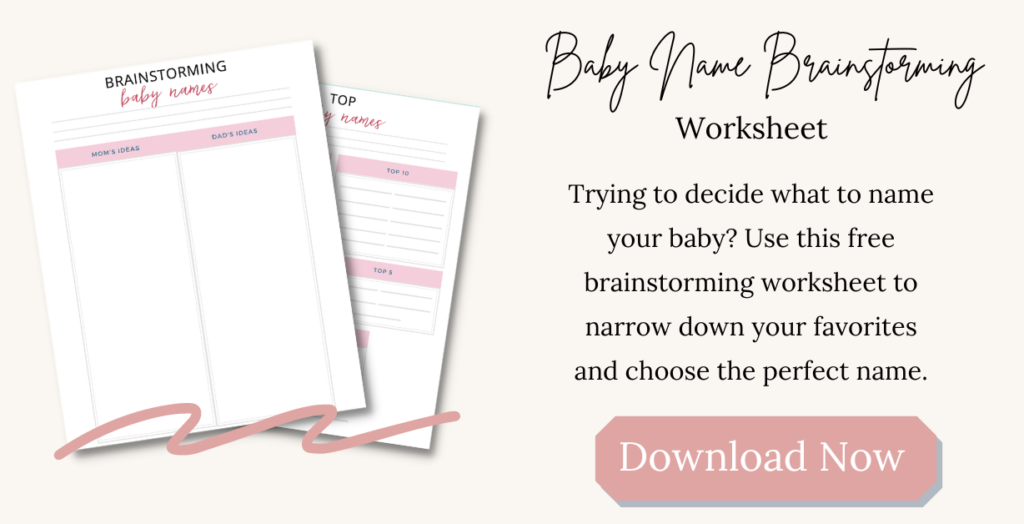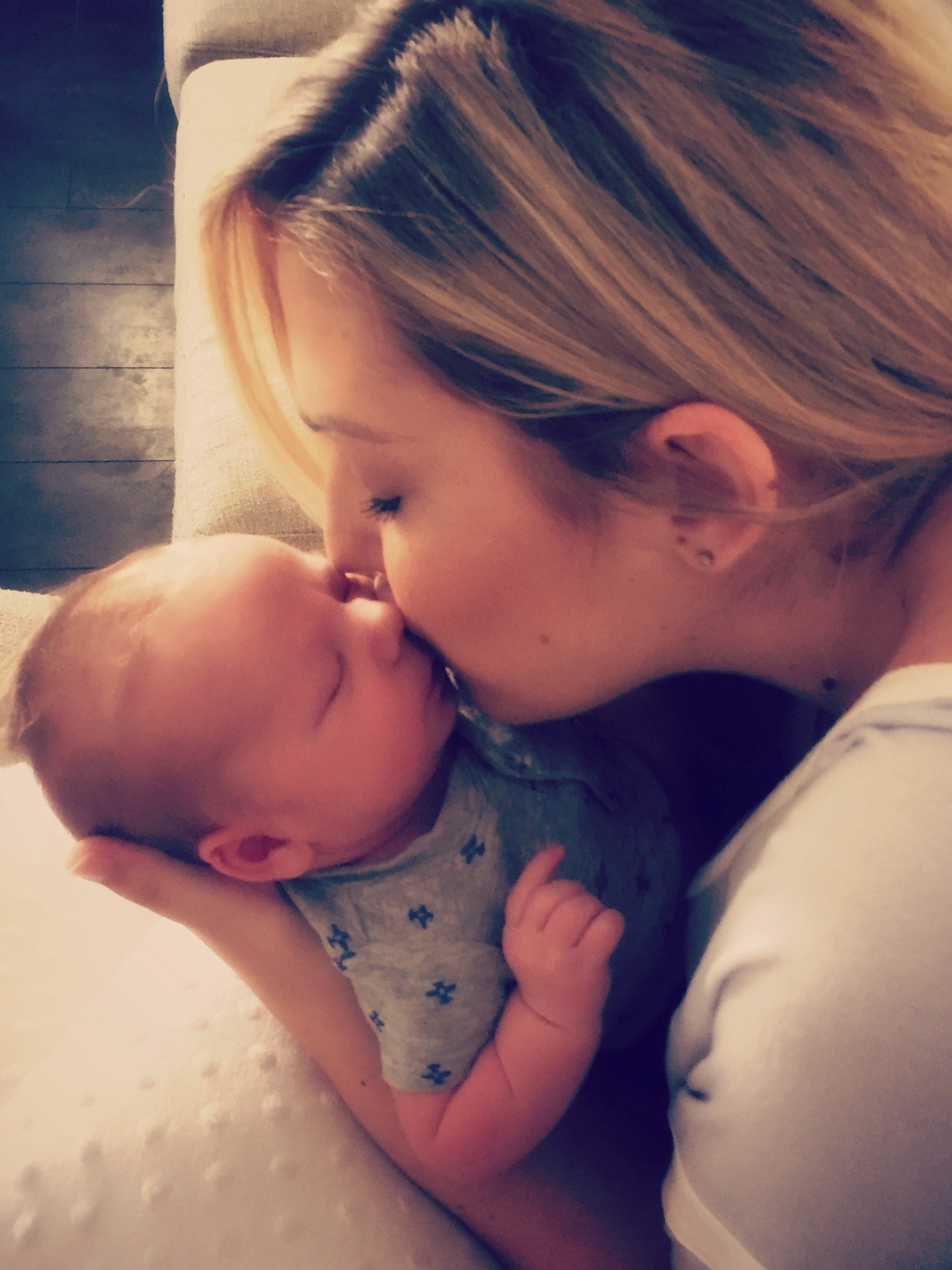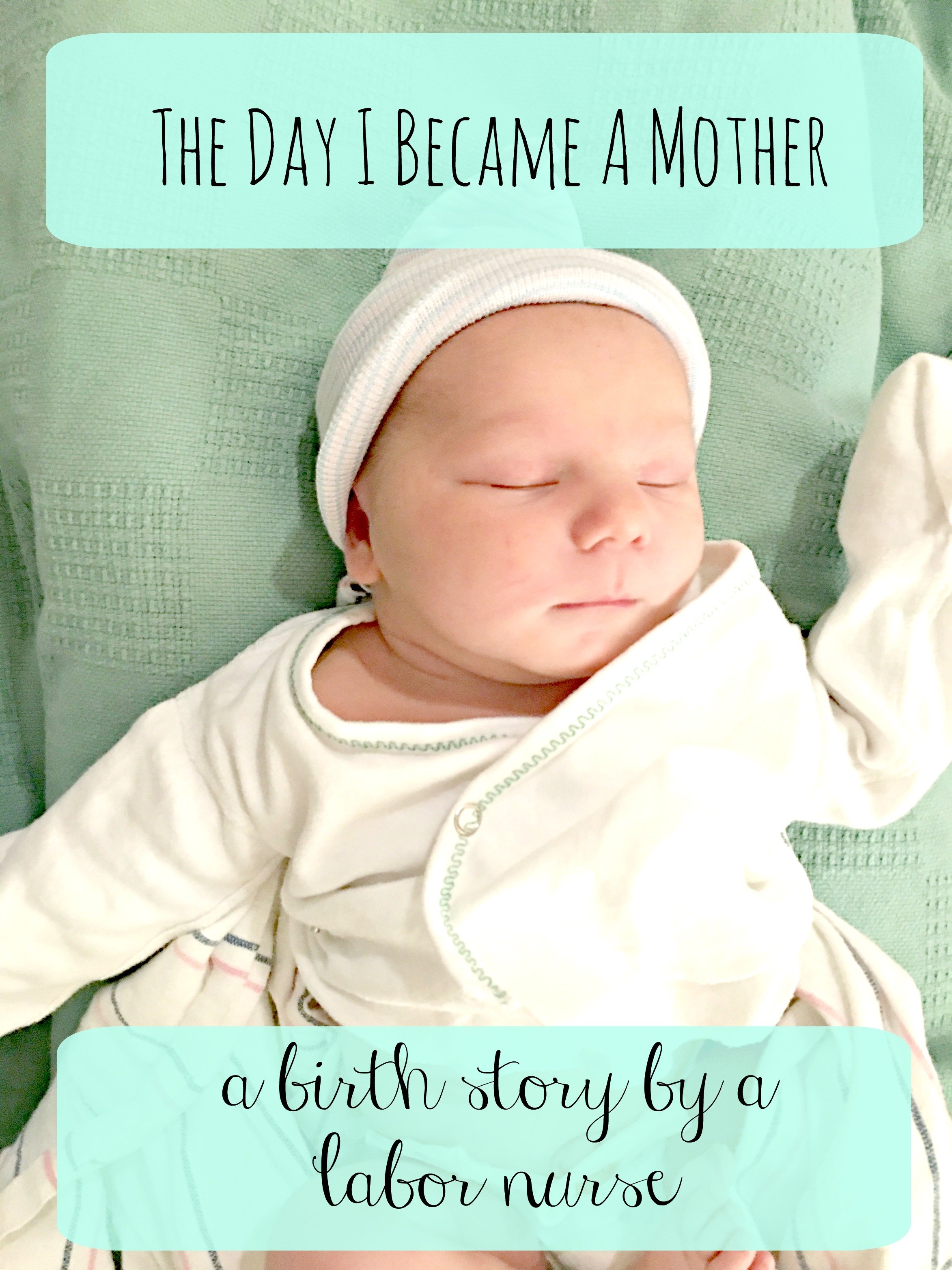First Trimester Bleeding – Why It Happens and What It Means
If you're in your first trimester of pregnancy and you're experience vaginal bleeding…take a breath. There can be a number of reasons for first trimester bleeding. I know that any type of bleeding while pregnant can be alarming, even for the most pragmatic mom-to-be. But I'm here to give you the facts to hopefully give you better insight into your pregnancy.
First trimester bleeding is just one of the things that can make this trimester more difficult than the others. Vaginal bleeding during pregnancy is never comfortable to experience. In the first trimester it can be especially daunting for new mothers who fear that their pregnancies may not have the outcome that they hope and pray for.
There is good news. You are not alone. Spotting or light bleeding in the first trimester occurs in about 25% of all pregnancies and often turns out to be harmless.
First Trimester Bleeding
Although it may be unnerving, vaginal bleeding in the first trimester might actually be more common than you think. Since nearly one third of all pregnancies experience some sort of bleeding in early pregnancy, you can rest assured that your body is not the only one handling early pregnancy this way.
I have experienced first trimester bleeding with all three of my pregnancies. I know how difficult it can be to not know what to expect. During my pregnancies, every little sign or symptom that sparks fear in me inspires an intense amount of research on my part. Lucky you, I have done my fair share of learning about causes of bleeding during pregnancy, how to know when it's serious, and what I can do about it. Plus, it doesn't hurt that I am a Labor & Delivery nurse. This is my world!
In this post, I've laid it all out there for you. Hopefully, after reading this post, you can rest your mind a little quicker than I could when I was having first trimester bleeding. Keep reading to learn everything you need to know about bleeding in early pregnancy.
Does Bleeding During Pregnancy Mean Miscarriage?
I know that it is scary. You feel worried about your pregnancy and what might happen to it. Fortunately, first trimester bleeding does not always mean miscarriage. In fact, 15-20% of women with normal, healthy pregnancies will have first trimester bleeding. On top of that, if a heartbeat is seen on ultrasound, over 90% of women who experience first trimester vaginal bleeding will not miscarry. To me, this is comforting to hear.
Even so, when you have bleeding in your first trimester, you now technically are experiencing what is called a “threatened miscarriage”. This is because the threat of miscarriage does increase slightly when you have first-trimester bleeding.
Your provider will diagnose you with “threatened miscarriage” if you are having bleeding and/or mild cramping but the cervix has remained closed and the embryo is still viable. In many cases of threatened miscarriage, the bleeding stops and the pregnancy continues to be normal and healthy. For others, the bleeding increases and eventually results in a spontaneous pregnancy loss.

Spotting vs. Bleeding During Pregnancy
Although any bleeding before 20 weeks gestation is a “threatened miscarriage” by definition, the type of bleeding that you have matters significantly.
Light bleeding or spotting is common in the first trimester of pregnancy and is typically no cause for alarm. You will know that you are experiencing “spotting” as apposed to “bleeding” if the discharge of blood is just a few drops occasionally found on your underwear or on the tissue paper after you wipe. If there isn't enough blood at any one time to cover a panty liner, then you are experiencing “spotting”. Spotting is usually not bright red in color but instead pink or brown.
Bleeding, on the other hand, is when you have a heavier flow of blood. In order to not saturate your clothes with blood, you will need to wear a pad. This blood is typically bright or dark red in color, similar to what you find during a period.
Causes of Bleeding During Pregnancy
According to the American College of Obstetricians and Gynecologists (ACOG), there are many reasons for vaginal bleeding in pregnancy and not all of them are a cause for concern.
1. Implantation Spotting
Implantation bleeding is one of the earliest signs of pregnancy. This type of early pregnancy bleeding happens before any signs of nausea, breast changes, or a positive pregnancy test and is just that – a symptom of pregnancy. Implantation bleeding is harmless. It is not a threat to your pregnancy.
This type of bleeding happens when the fertilized egg attaches itself to the uterine lining. The damage that the embryo does to the lining as it buries deeper can cause a few days of light bleeding or spotting.
Some women experience this spotting within the first six to twelve days after ovulation before she even knows she is pregnant or misses her period. Some women actually can confuse this spotting for a very light period because it comes just before the time when a period is expected to start.
Implantation bleeding can be really confusing for many women because the amount, consistency, color, and duration of the bleeding can be different for everyone. Typical implantation bleeding for most women is light spotting for a couple of days not resembling the amount or duration of a period. Implantation bleeding should be pink or brown without the presence of bright red blood.
- Related Read: 26 Early Signs Of Pregnancy Before Your Missed Period
2. Subchorionic Hemorrhage
Also called a Subchorionic Hematoma. This is a clot or build up of blood behind the placenta, threatening miscarriage of your pregnancy. Thankfully, the diagnosis of a Subchorionic Hemorrhage in early pregnancy does not indicate an imminent miscarriage. A Subchorionic hemorrhage can resolve and result in an uncomplicated pregnancy.
If a Subchorionic Hemorrhage is present but there are fetal heart sounds, likely you will be cautioned that you can expect continued bleeding without miscarriage OR a possible impending miscarriage. There is no way to know if your body will reabsorb the hemorrhage or if the hemorrhage will grow large enough to detach the placenta from the wall of the uterus and result in a miscarriage.
Don't worry too much. It is absolutely possible to continue with a normal pregnancy after finding out that you have a Subchorionic Hemorrhage. Most Subchorionic hemorrhages resolve on their own and do not need intervention of any kind.
3. Cervical Changes
In early pregnancy, your cervix is receiving more blood flow than prior to getting pregnant. Anything that might irritate the cervix such as a cervical exam, Pap smear, or intercourse can all cause bleeding from the cervix.
Sometimes your cervix will become quite friable in pregnancy. Every little thing can cause irritation of the cervix and create small amounts of bleeding during pregnancy. This type of bleeding has no threat to your pregnancy. Typically, this will resolve by the end of the first trimester when your body starts to get used to all of the changes it's going through.
4. Trauma
Any physical action that may result in the cervix being disturbed can be considered trauma. Even normal, seemingly harmless actions such as sexual intercourse, a gynecological exam, a vaginal ultrasound, or even heavy lifting/ exercise can cause bleeding in early pregnancy.
Spotting may occur within 24 hours after intercourse, a cervical exam done by your provider, or Pap smear. If the bleeding continues longer than 24-48 hours after cervical trauma, you can assume that there may be another underlying problem.
5. Infection
Any infection in the vagina such as bacterial vaginosis or a sexually transmitted infection such as chlamydia, gonorrhea, or herpes, can cause bleeding in the first trimester. The infection needs to be treated as soon as possible in order for the bleeding to subside.
6. Ectopic Pregnancy (Tubal Pregnancy)
In an ectopic pregnancy, the fertilized egg implants outside of the uterus, typically in the fallopian tube. If the embryo continues to grow, it can cause damage to the Fallopian tube and even cause it to burst. This type of pregnancy will not be able to progress normally and can be life threatening to the mother if left untreated.
Symptoms of an ectopic pregnancy include bleeding, cramping, and sharp abdominal pain. An ectopic pregnancy might be considered if the Beta HCG level is higher than 1,500 to 2,000 mIU per mL but the gestational sac is not visible upon ultrasound.
7. Gestational Trophoblastic Disease
Also known as a Molar Pregnancy, this rare type of pregnancy is when abnormal tissue grows in place of a baby. This type of pregnancy will not result in a viable baby and must be treated with a D&C. If untreated, a molar pregnancy can become cancerous and spread to other parts of the body.
A molar pregnancy occurs when there is an abnormality during fertilization that results in the growth of abnormal tissue. Although the embryo is not typical of a healthy pregnancy, it will lead to the typical symptoms of early pregnancy until the mole has been diagnosed. A molar pregnancy is considered when an unexpectedly high beta HCG level is noted and then ultrasound is performed to confirm the diagnosis.
8. Incomplete Miscarriage
Typically a miscarriage is referred to by medical professionals as a “Spontaneous Abortion”. The term simply means that it happened on it's own. If you are experiencing an incomplete miscarriage, the embryo does not have a heartbeat past 6 weeks of gestation but your body has not passed the pregnancy. Sometimes with an incomplete miscarriage, you will experience bright red spotting or bleeding but your uterus has not been triggered to expel the pregnancy and may need medical assistance to do so.
9. Miscarriage
Sadly, miscarriages happen in around 15-20 percent of all pregnancies. Miscarriage is most common in the first 12 weeks of pregnancy but is defined as the spontaneous loss of a pregnancy in the first 20 weeks. A miscarriage often presents itself with bright red bleeding, similar to a period with cramping, abdominal pain, and/or back pain. Upon exam by your provider, your cervix will be open and tissue may pass through the vagina.
If you are very early, you may be experiencing a chemical pregnancy. A chemical pregnancy is a type of miscarriage that you will only be aware of if you had a very early positive pregnancy test. A chemical pregnancy occurs when an egg is fertilized but never fully implants into the uterus. You may be able to get a positive pregnancy test very early on but then have vaginal bleeding and cramping immediately afterwards as the fertilized ovum fails to implant.
- Related Read: What To Do When You Find Out You're Pregnant
10. Non-Obstetric causes of bleeding
Non-obstetric meaning not pregnancy related. These causes can be cervicitis, vaginitis, cystitis, cervical cancer, or polyps. Polyps are harmless growths on the cervix that are more likely to bleed during pregnancy because of your body's higher estrogen levels and higher blood volume during that time. Cervicitis and vaginitis are just basically irritation of the cervix or vagina. This can happen more often in pregnancy than otherwise but typically does not pose risk to your pregnancy.
11. Hemorrhoids
Yes, this one is surprising, I'll admit. Hemorrhoids are a non-vaginal cause of bleeding in early pregnancy but it can often be mistaken for vaginal bleeding. If you are finding blood on the toilet paper after wiping or blood in the toilet after using the restroom, you may be confusing blood from the rectum as blood from the vagina.
Bright red blood from the rectum can be caused by hemorrhoids, a rectal polyp, or a tear in the rectum caused by constipation. Rectal bleeding is not a cause for alarm regarding the safety of your pregnancy, but it may be uncomfortable. Talk to your doctor about what you are experiencing to see if there is anything that can be done.
Does First Trimester Bleeding Always Indicate a Problem?
Bleeding during early pregnancy may be abnormal depending on the source of bleeding. Fortunately, it is not always a cause for concern. Don't panic when you find yourself experiencing light bleeding in the first trimester.
Most pregnancies, even those with first trimester bleeding, will end up progressing normally. If you are far enough along to detect a heartbeat, you are already farther along than the vast majority of all miscarriages. If your baby's heartbeat has been seen and heard by you and your provider, you can have a little bit more reassurance that your pregnancy is on the right track. This is the case even with first trimester bleeding.
The urgency at which you get medical care depends on what kind of bleeding you are having and what other symptoms you have along with it. Implantation bleeding, sexual intercourse, hemorrhoids, or cervical changes in early pregnancy do not indicate a problem with the viability of your pregnancy. Still, no matter what kind of bleeding you are experiencing, whether it be spotting or something more, you should always communicate your symptoms with your OB provider to be sure it is not something serious. This is especially important if you are having heavy bleeding similar to your menstrual period or severe abdominal cramping to rule out serious complications such as ectopic pregnancy.
Normal First Trimester Bleeding
Often times, when a woman experiences early pregnancy bleeding, she will be able to find signs that let her know that her bleeding isn't something to lose sleep over.
As we have previously discussed, there are times when first trimester bleeding is perfectly normal and expected to be harmless.
- Implantation bleeding
- Cervical changes
- Sexual Intercourse
- Cervical Polyps
- Hemorrhoids
Since it is difficult to tell the difference between “normal” and serious bleeding during pregnancy, it is best to talk to your doctor about what you're experiencing to be sure that it's not dangerous.

When To Worry About First Trimester Bleeding
Although first trimester bleeding is not always an emergency, there are certainly times that bleeding during pregnancy can be serious and require a visit with your doctor. In order to know when spotting or bleeding during pregnancy is serious, you need to be constantly aware of the signs that may indicate a pregnancy complication.
Things that you need to remember to keep track of when experiencing bleeding during pregnancy are as follows:
- Is the bleeding heavy or light? Is it mild spotting or a flow like a period?
- How long has the bleeding lasted? Has it been a few times over the last couple of days or has it been progressing over time?
- When did it start? When does it happen? Do you notice that there is a pattern to it?
- Is the bleeding triggered by something such as sex or after using the restroom?
- Do you only see it after sex and exercise or does it happen after rest?
- What color is it? Is it light pink, bright red, or brownish?
- What is the consistency of the bleeding? (light, watery, thick, slippery, containing clots etc)
Seek immediate medical attention if you are experiencing any of the following symptoms. These could be signs of serious problems related to miscarriage:
- Severe pain in the lower abdomen
- Heavy bleeding, like the heaviest day of your period
- Bleeding along side moderate to severe cramping
- Passing fetal tissue through the vagina
- A fever of 100.4 degrees Fahrenheit or more
- Dizziness or fainting
Is It Implantation Bleeding or an Early Miscarriage?
If you have already found out that you are pregnant, any bleeding at all will reasonably make you question what is going on. Is it implantation bleeding? Is it a very early miscarriage? What do I do? It can all be very confusing.
I'll try to clear things up a little bit more.
If you are worried that miscarriage may be imminent, speak to your doctor about possibly running a Beta HCG level. This will consist of at least two blood draws 48 to 72 hours apart. This test helps to determine if your human chorionic gonadotropin (the hormone produced by the embryo's placenta) is approximately doubling in an appropriate time frame. If your HCG level is approximately doubling in 48-72 hours, then you can be temporarily reassured that miscarriage is not upon you.
If your bleeding is not due to an impending miscarriage and is in fact just implantation bleeding, it will not have clots, fill a pad, happen in conjunction with period-like cramping, or get progressively heavier as time goes on.
Managing First Trimester Bleeding
Many times, all you need is a little bit of reassurance. I know how it feels to want someone to just tell you “it's going to be ok. This is totally normal”. Most of the time you won't get this from your provider because they can't guarantee that everything is going to be “ok”. You are the only one that will be able to give yourself that reassurance.
Your first step in managing first trimester bleeding is to get educated about it.
The second thing you need to do to manage your first trimester bleeding is to give yourself time. There is no use in googling “how to stop first trimester bleeding” or “what can I do to prevent first trimester bleeding”. This assumes that you have full control over what's happening within your body and that if you're bleeding, then you are doing something wrong. This is just not the case.
The third thing to do to manage your first trimester bleeding is to never use a tampon or have sex while you are currently experiencing bleeding or spotting. If you are having any type of bleeding during pregnancy, you should wear a pad or panty liner. Wearing a pad will help you keep track of how much blood you're having, what color it is, and help you communicate effectively with your provider if you need to.
Treatment of First Trimester Bleeding
If your bleeding is due to miscarriage in early pregnancy, there is nothing that can be done to stop it. Unless the cause of first trimester bleeding is a risk to your own life, there is likely nothing to be done. Usually, if the bleeding is diagnosed as implantation bleeding, Subchorionic Hemorrhage, trauma, or cervical changes, there will be no other intervention other than resting and waiting.
Sadly, if your bleeding has been determined to be something more concerning such as molar pregnancy, ectopic pregnancy, incomplete miscarriage or imminent miscarriage, the only option (other than waiting it out – which can sometimes be a very bad idea) is intervention to help end/remove the pregnancy. We cannot stop an imminent miscarriage or reverse a poor pregnancy outcome. I really wish we could.
In cases where there is no other fate but the end of the pregnancy, the intervention that you can anticipate will be surgery to remove the embryo, medication to help expel the embryo, or, yet again, time to wait until it all passes on it's own.
What You Can Do About First Trimester Bleeding
Although you may not be able to stop the spotting or bleeding that you experience during early pregnancy, there are things that you can do to nurture your pregnancy during a time when you are wondering if your pregnancy will result in everything you ever wanted or your worst nightmare. Talk to your provider and try to do these few things:
- Get rest. Try to kick your feet up, take more naps, and give yourself more opportunity to relax. Your body is doing a lot of work right now. It might just need you to slow down to allow it to do this huge, important job.
- Hydrate. I feel like drinking more water is the key to a healthy pregnancy for so many reasons. Water, water, water. Make a point to drink more.
- Do not over-exert yourself. It is a good idea to exercise in pregnancy to keep your body healthy. That being said, try to modify as much as possible to accommodate your pregnancy. Limit heavy lifting, running, jumping, and other strenuous activities.
Remember that bleeding in pregnancy and miscarriage are not your fault. There is nothing that you did wrong, nothing that you could have done differently, and nothing to feel guilty about. Do your best to treat your body and mind well during your pregnancy. Remember that that is all you can do.
Bleeding In The First Trimester
While it is completely natural to worry about miscarriage if you are having first trimester bleeding, you can see from this post that there are a number of other reasons why you can be experiencing spotting during your pregnancy. Some reasons are harmless. Some reasons just take time. And others, unfortunately, are more serious. The best thing that you can do is breathe, say a prayer, and talk to your doctor so that together you can identify the cause of your first trimester bleeding and make a plan.
I will be thinking about you, mama! I've been where you are and I hope that I see you in my free pregnancy email sequence very soon!

Please note: I am not a doctor and I am not giving medical advice. Information on this website is not intended to diagnose, or treat any form of any disease. This article is for informational and entertainment purposes only. I am only telling you what my experiences are. Please refer to my Disclaimer Page for more information
This post might contain affiliate links. To learn more, you can read my full disclosure here.
Leave a comment below to let me know that I'm not the only one that has first trimester bleeding with every pregnancy! Anyone else?
What To Read Next:
- Important Pregnancy Must Haves To Help You Survive The First Trimester
- 26 Early Signs of Pregnancy Before Your Missed Period
- What To Do When You Find Out You're Pregnant
- 13 of The Absolute Best Pregnancy Tips For First Time Moms
- How To Care For Yourself and Your Heart After Miscarriage or Stillbirth











Thanks for this! I’m trying not to panic over occasional spotting.
You’re welcome! Yeah, it happened to me with each of my pregnancies. Sometimes it really isn’t something to panic about.
I know it’s different for everyone but anecdotally, can you give an idea of what you’re spotting experiences were like with your healthy pregnancies?
I’m 6-7 weeks along, we just heard a heartbeat 4 days ago, but last night and this morning I’m seeing brown spotting when I wipe and a little in my underwear. How long did yours last when you had it?
Thank you for this. I recently found out I’m expecting and today I started to experience bleeding. I’m so worried, but I’ve already spoken to my OB and am waiting on bloodwork. Your article helped me feel a little less stressed.
I’m glad I could help a little bit, Celeste! You did the right thing by talking to your OB and getting blood work done. But you’re right not to stress about it! Congrats on your pregnancy and good luck!
This is so reassuring! I’m 5 weeks pregnant with my second baby and experienced bleeding with my first also.. I never got any answers as to why but this would have saved me so much worry and stress had I read this before. I’m also currently experiencing spotting. Hoping that that’s all this is. But Thank you so much for this informative read!
You are so welcome, Kristine!
I just found out that l am spotting .u really helped me to calm a little bit , through I’m still worried , going to see my doctor tomorrow
I’m glad i helped you keep calm while you waited for your appointment. I hope it went well!
I’m 7weeks to 8 with twins is light spotting normal?
Hey Eden! It certainly can be but you should always consult your doctor to be sure. Congrats on your twin pregnancy!
I’m so glad I came across this! I too recently found out I’m pregnant with our second. But spotting/bleeding is new for me, I didn’t experience it with my first pregnancy. I started spotting earlier this week with mild cramping. They did an ultrasound & baby has a heart rate of 123 and was wiggling. They determined that I’m almost 7 weeks. I came back in 48 hrs to retest my levels and they almost doubled. She said I had subchorionic hemorrhage. The bleeding stopped but it came back a day later. I’ve been taking pictures to keep updates. I’m trying not to freak out though. Again, thank you so much for this read..it has helped a lot.
You’re welcome, Jordan! I wish you all the best during your pregnancy!
I am almost 9 weeks pregnant and I experienced bleeding yesterday with a little bit blood clot, but the bleeding cannot full the pad,until now i have a light bleefing but I had my ultrasound 1 week ago it had a heartbeat of 137, i will go to ER tommorrow to know what it is happeninh hoping that it is not miscarriage,but because of your explanations I am now less nervous.Thank you to your column I learned a lot not to panic.
I’m so glad that this post helped you to release some of the panic feeling. How did it go? I hope everything is well!
Thank you for this post! I am 6 weeks pregnant and have had light bleeding today. This post reassured me and the comments helped me feel less alone. It’s a scary thing, but reassuring to know that it’s common. I have my 8 week appointment in 8 days and will hopefully have more answers then.
I am so glad that I could help even just a little. I’ll be keeping you in my thoughts! Good luck at our appointment!
Hi..7wks pregnant andI’m having a spotting for 4 days already. I did ultrasound yesterday to know the cause. They told me its too early to know because its still small and its look like 6wks only. That night I feel pain on my abdomen and when I went to the washroom its not spotting anymore i’m bleeding and passing 3 blood clot like a tooney size. I’m so nervous because I already experienced 2 miscarriages already but the the thing is I don’t feel bad pain on my abdomen unlike my previous miscarriage that to the point I feel dying because of the pain. This one is different. I went to the hospital and I was there for half a day and I didn’t feel any pain at all. Everytime I went to the washroom my pad is empty ( no blood) just when you wiped it only or if I pee theres blood. So the doctor took me a blood test they call ot hcg. They sent me home they want me to come back after 2 days for hcg blood works again. So now im still having spotting, the bleeding was lessen after passing that blood clot. After reading your post I just feel relieved and am still hoping that everything will be alright.
Hey there Gian! I will keep my fingers crossed for you! Spotting can be normal but passing clots can be a little concerning when it comes to pregnancy at any stage. Your HCG levels will definitely help you and your provider get answers. Good luck!
Hey! Im 8 weeks pregnant but the transvaginal ultrasound that my baby is only 6 weeks and 6 days and crown-rump of 7.5 but still has no fht😔 i had a miscarriage last 2019. Im really relieved with what you’ve stated in this article hoping that this tiny baby inside me will still survive since ive been bleeding for 5 days. Just broen discharges and not reddish, no bloodclots. Hmmmm…. im still hoping that everything will turn out fine since im scheduled with another transvi this coming saturday march 27,2021….
I will keep you in my thoughts!Sending all the good vibes your way. 🙏🏻
Hello!
I’m 6 weeks pregnant. I’m experiencing some spotting it started 2 days ago, and it’s still going. Did the doctors ever tell you what was causing your first Trimester bleeding? I got blood work done yesterday, so they can check my levels. I did not experience first trimester bleeding with my first one, so this is a little concerning to me.
With two of my pregnancies there was no known reason why it was happening. But with one of my pregnancies it was because of a subchorionic hematoma. You can also find some more possibilities here: https://alifeinlabor.com/first-trimester-bleeding/
Thank you Heather. After reading your article I feel a little better. I’m 9-weeks pregnant and have experience spotting for the past two days. I’m waiting on results of a blood test.
This is my first pregnancy and it was a pleasant surprise! I have been trying to cope with being as informed as possible and not giving up hope.
I’ll be keeping you in my prayers, Melissa! You’re doing the right thing by looking up information but trying to stay calm. Many times, spotting is nothing. But it’s always a good idea to let your doctor know just in case. Good luck to yoU!
I must say I am a little nervous. I am 40 years old and had my first visit on yesterday with my OB…. I was washing dishes and I felt moisture… Went to restroom and saw the pink in my panties… Really scared me….I am 5 weeks 5 days very early and they had not detected a heartbeat…. I am praying that everything is ok… I did go for a 30 minute walk and had intercourse the night prior so this could have triggered it but I am going to call my doctor.
Yeah definitely call your doctor for sure. I’ll be crossing my fingers that everything is still going well for you!
Thanks very much I have learned A lot. Is my first time having pregnancy bleeding. Be blessed my sister
Thanks, Marichen!
I experience spotting after sex while pregnant because of endocervical polyp… Now I’m worried if this will affect my pregnancy… I’m 11 weeks pregnant..
If you’re worried, you should always let your doctor know about it for sure! But if it was just the polyp that bled, your pregnancy should be safe!